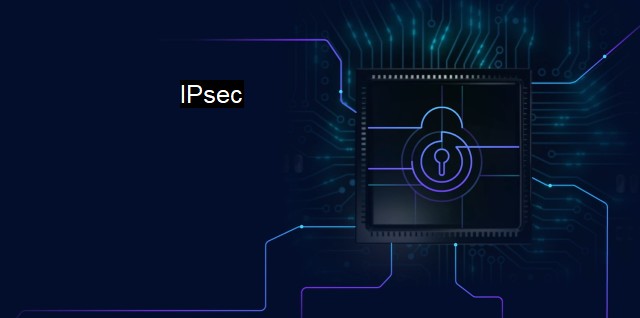What is IPsec?
Exploring the Significance of IPSec in Cybersecurity and Antivirus: A Guide to Understanding the Internet Protocol Security Protocol for Added Network Security
IPsec, or Internet Protocol Security, is a protocol suite for securing Internet Protocol (IP) communications by authenticating and encrypting the casted data packets. If said in simpler terms, IPsec can be viewed as a method to ensure a safe and private conversation between two or more parties over the internet, very akin to having a confidential discussion in a room without any leak of details to the outside world.IPsec operations include the setting up of mutual authentication between agents at the establishment of the session and negotiation of cryptographic keys to be used during the session. It's fundamental as it safeguards communications in a network layer, hosting multiple application layer services.
The discipline of cybersecurity is highly dependent on IPsec as it works not only as a robust security facilitator but also as a top-notch defender against varied malware, viruses, and threats that often users across the globe are prone. Prominently used for VPN (Virtual Private Network) applications, setting an IPsec into play further brings about a layer of confidentiality, control, and checkpoints that assists cybersecurity teams to circumvent malicious infiltration attempts to a great extent.
IPsec lets data packets to be encrypted, ensuring they can't be interpreted without the correct encryption keys. This means that even if a malicious actor was able to access these data packets, they wouldn't make any sense without the appropriate decrypting tool. Even inside a VPN tunnel, the data packets are secured through IPsec, generating a reliable and shielded structure.
IPsec also provides an 'Authentication Header' (AH) to the data packets. The authentication header contains information and security parameters facilitating identifying, authenticating, and subsequently asserting the credibility of the sender. In cybersecurity scenarios, this contributes to preventing spoofing attacks where an intruder pretends to be someone through simulated specifications.
Ensuring the integrity of the data transferred naturally becomes a pivotal concern, primarily in organizational settings. IPsec employs a method known as 'Cryptographic Synchronization', where the entire data packets are encrypted, and a cryptographic checksum is attached. Through this methodology, it bolsters assurance that the data integrity is not lost, and what had been transmitted stays invincible in transit.
Being a high-class facilitator, IPsec enhances strong administrative control over its processes. With cryptography algorithms entailed within, this established suite creates distinct keys related to each security-session held. Cutting the concern of potential misuse and wrongful event of man-in-the-middle curb sorts of potential threats in half.
Antivirus software often works in close quarters with IPsec to further enhance its protection. Antivirus programs run protocol checks and signature recognition processes, identifying potential threats hidden in the incoming and outgoing data packets. IPsec, with its robust encryption, complements the process by retrospectively reducing the achievable illegitimate access to the packets further.
IPsec acts as a robust cornerstone in the arena of cybersecurity and antivirus. With its top-end encryption features, functionality to wrap up communications into the form of secured 'tunnels', to skilled handling of certain intrusions and facilitating data packets disbursement securely - IPsec asserts a compact pact of privacy.
It's essential to encode that, while IPsec does a terrific job at imposing crucial cybersecurity measures, it isn't solely the “bulls-eye solution”. It operates best when reposing between a comprehensive lineup of other cybersecurity strategies and techniques which together collaboratively ensure the encompassing security environment required. Given that, its significance, and the prestige it holds in the field of cybersecurity and antivirus protection, assures its continual importance in the foreseeable digital future.

IPsec FAQs
What is IPsec?
IPsec stands for Internet Protocol Security. It is a protocol suite used in cybersecurity to secure internet communication across networks by providing authenticity, confidentiality, and integrity of data transferred between devices.How does IPsec work?
IPsec works by encrypting the data packets transmitted between devices using a combination of authentication and encryption algorithms. This ensures that the data exchanged between devices is secure and cannot be intercepted or tampered with by any unauthorized parties.What are the benefits of using IPsec?
IPsec provides several benefits to cybersecurity and antivirus. It helps to secure the communication between devices, prevents unauthorized access to data, and provides data privacy and confidentiality. IPsec also provides protection against various types of attacks, including Man-in-the-Middle attacks and Denial-of-Service attacks.When should you use IPsec?
IPsec should be used whenever there is a need to secure internet communication between devices, especially when transmitting sensitive information over public networks. It is commonly used in Virtual Private Networks (VPNs), site-to-site connectivity, and remote access solutions.| | A | | | B | | | C | | | D | | | E | | | F | | | G | | | H | | | I | | | J | | | K | | | L | | | M | |
| | N | | | O | | | P | | | Q | | | R | | | S | | | T | | | U | | | V | | | W | | | X | | | Y | | | Z | |
| | 1 | | | 2 | | | 3 | | | 4 | | | 7 | | | 8 | | |||||||